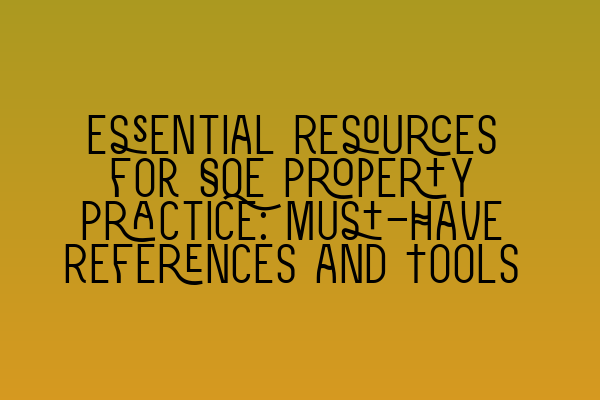Essential Resources for SQE Property Practice: Must-Have References and Tools
As a property law practitioner, having access to the right resources and tools is crucial for staying informed, providing top-notch legal services, and staying ahead of the competition. In this blog post, we will explore some essential references and tools that every SQE property law professional should have in their arsenal. These resources will not only help you enhance your knowledge and understanding of property law but also streamline your practice and improve your efficiency.
1. Property Law Reference Books
A good property law reference book is a must-have for any property law practitioner. It serves as a comprehensive resource that covers the fundamental principles, case law, and legislation relating to property transactions. The book should be regularly updated to ensure that you have access to the latest legal developments.
One highly recommended property law reference book is “Modern Land Law” by Martin Dixon. This book covers all aspects of land law, including ownership, leases, mortgages, easements, and registration. It provides a clear and concise overview of the subject matter, making it an excellent resource for both students and professionals.
Another useful reference book is “Property Law: Practice, Problems, and Perspectives” by Ann Wilton. This book offers practical insights into property law practice, including drafting tips, case analysis, and problem-solving exercises. It is a valuable resource for those looking to develop their practical skills in property law.
Remember to regularly update your collection of property law reference books to keep up with the evolving legal landscape.
2. Online Legal Research Tools
In the digital age, online legal research tools have become indispensable for legal professionals. These tools provide instant access to a vast amount of legal information, helping you find relevant cases, legislation, and commentary with ease.
One popular online legal research tool is Westlaw UK, which offers a comprehensive collection of case law, legislation, and legal journals. It has powerful search functionality and user-friendly interface, making it a go-to resource for legal research.
LexisLibrary is another renowned online legal research tool that provides access to a wide range of legal materials, including case law, legislation, legal commentary, and precedents. It offers advanced search options and personalized alerts to help you stay up to date with the latest legal developments.
Investing in a subscription to these online legal research tools is essential for property law practitioners who want to deliver high-quality and up-to-date legal services.
3. Land Registry Practice Guides
The Land Registry practice guides are invaluable resources for property law practitioners dealing with land registration matters. These guides provide detailed information on various topics, including registration procedures, application forms, and specific transactions.
One particular practice guide that is particularly relevant for SQE property practice is the “Registrations: Practice Guide” published by the Land Registry. This guide covers the registration requirements for different types of transactions, such as transfers, leases, and charges. It provides step-by-step guidance on completing application forms and includes examples and explanations to help you navigate the registration process efficiently.
Stay updated with the latest Land Registry practice guides to ensure that your land registration practice is in line with current best practices.
4. Property Management Software
Property management software can significantly streamline your property law practice by automating routine tasks, organizing client information, and improving collaboration with other stakeholders.
One popular property management software is Clio, which offers features such as document management, time tracking, and billing. It allows you to manage your cases, keep track of key deadlines, and generate invoices seamlessly.
Another widely used property management software is Proclaim, which is specifically tailored for property law professionals. It offers features such as case management, email integration, and task automation to help you streamline your workflow and increase productivity.
Investing in property management software can save you time and effort, enabling you to focus on providing the best possible legal services to your clients.
Conclusion
In the competitive field of property law, having access to the right resources and tools can make a significant difference in your practice. From property law reference books to online legal research tools, Land Registry practice guides, and property management software, the resources mentioned in this article are essential for any SQE property law professional.
By utilizing these resources, you can enhance your legal knowledge, streamline your practice, and deliver exceptional services to your clients. Remember to stay updated with the latest legal developments and continuously expand your knowledge base to stay ahead in this dynamic and ever-evolving field.
For more resources and preparation materials for the SQE exams, check out the related articles below:
